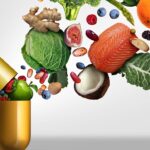Juicing Tips
Juicing Tips Presented by Mr. Sunny Seward & Dr. Michael Wald – Integrated Medicine & Nutrition
 This information is for educational purposes only. Some fruits and vegetables may adversely interact with nutritional supplements or medications. Juicing may cause unpleasant symptoms ranging from, but not including, fatigue, indigestion, diarrhea, nausea, heart burn, muscle and joint aches, headache, allergic reactions, etc. Please consult with a trained health professional before introducing medicinal juicing if you have chronic health problems, are pregnant, take herbs or nutritional supplements or are on prescription medication.
This information is for educational purposes only. Some fruits and vegetables may adversely interact with nutritional supplements or medications. Juicing may cause unpleasant symptoms ranging from, but not including, fatigue, indigestion, diarrhea, nausea, heart burn, muscle and joint aches, headache, allergic reactions, etc. Please consult with a trained health professional before introducing medicinal juicing if you have chronic health problems, are pregnant, take herbs or nutritional supplements or are on prescription medication.
Juicing has the potential of being one of the most, if not the most, powerful adjunct to a healthy diet for the treatment and/or reduction of chronic disease occurrence. The benefits of juicing are extreme ranging from improved detoxification, enhancing cellular energetic, reducing inflammation, immune modulation, supplying dense and live nutrition and more.
Use pesticide free veggies. It is wise to choose organic whenever possible. However, some vegetables are worse than others. Below are the vegetables that are the most pesticide loaded ones according to the Environmental Working Group. So it would be wise to only purchase these vegetables if they are organically grown. The worst ones are listed first:
- Celery
- Spinach
- Kale
- Collard Greens
- Lettuce
- Carrots
- Cucumber (not bad if you peel the skin)
If you are new to juicing, start out with these vegetables, as they are the easiest to digest and tolerate:
- Celery
- Fennel (anise)
- Cucumbers
These three aren’t as nutrient dense as the dark green vegetables. Once you get used to the 3 vegetables listed above, you can start adding the more nutritionally valuable, but less palatable, vegetables into your juice:
- Red leaf lettuce
- Green Leaf lettuce
- Romaine lettuce
- Endive
- Escarole
- Spinach
After you’re used to these, then go to the next step:
- Cabbage
- Chinese Cabbage
- Bok Choy
When you’re ready, move on to adding herbs to your juicing. Herbs also make wonderful combinations, and here are two that work exceptionally well:
- Parsley
- Cilantro
Note: You need to be cautious with cilantro, as many cannot tolerate it well. If you are new to juicing, hold off on the cilantro. These are more challenging to consume, but they are highly beneficial.
Only use one or two of these leaves, as they are very bitter:
- Kale
- Collard Greens
- Dandelion Greens
- Mustard Greens (bitter)
If you would like to make your juice taste a bit more palatable, especially in the beginning, you can add these elements:
Lemons and Limes: You can also add a quarter to half a lemon a lime (leaving much of the white rind on).
Cranberries: You can also add some cranberries if you enjoy them. Researchers have discovered that cranberries have five times the antioxidant content of broccoli, which means they may protect against cancer, stroke and heart disease. In addition, they are chock-full of phytonutrients, and can help women avoid urinary tract infections. Limit the cranberries to about 4 ounces per pint of juice.
Fresh ginger: This is an excellent addition if you can tolerate it. It gives your juice a little “kick”! And, as an added boon, researchers have found that ginger can have dramatic effects on cardiovascular health, including preventing atherosclerosis, lowering cholesterol levels, and preventing the oxidation of low-density lipoprotein (LDL).
Drink your vegetable juice right away, or store it very carefully.
Put your juice in a glass jar with an airtight lid and fill it to the very top. There should be a minimum amount of air in the jar as the oxygen in air (air is about 20 percent oxygen) will “oxidize” and damage the juice.
Purchase a food vacuum pump like Food Saver with a Ball jar attachment. You can pour your juice into a pint jar and put the lid on and use the Food Saver to suck out the air in the jar to vacuum pack it. This will remove most of the oxygen that will damage the juice.
Immediately store it in the fridge and consume it when you are ready. It is best to drink it as soon as possible and in any case within 24 hours of juicing.
Clean your juicer properly
Whatever you do, you need to clean your juicer immediately after you juice to prevent any remnants from contaminating the juicer with mold growth.
Dr. Wald’s Favorite Smoothie Recipe
Purchase from the supermarket a bag of mixed, frozen fruits containing blueberries, strawberries, bananas, mango’s – whatever fruits you like!
- For one serving use one handful of frozen fruit and put it into a blender.
- Fill the blender with apple juice (or pear juice or orange) to cover the frozen fruit
half way.
- Use purified water and cover the frozen fruits completely.
- Add 1/3rd scooper (small scoop in supplement canister) of each of the following natural, concentrated foods supplements:
- Green Detox (for gentle ongoing detoxification); Brain Energy Blast (for enhanced energy balance); Purple Longevity (has nutritional longevity factors); Reds Protect (free radical fighter).
- Blend all up together for 30 seconds and you are ready to enjoy a delicious, comprehensive nutritional food!
 Next Post
Next Post